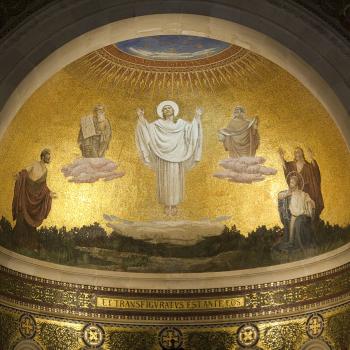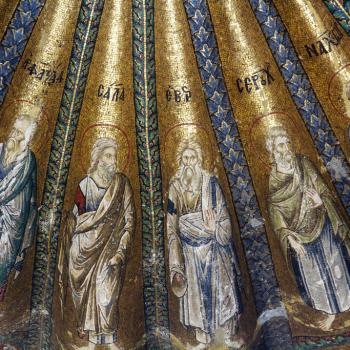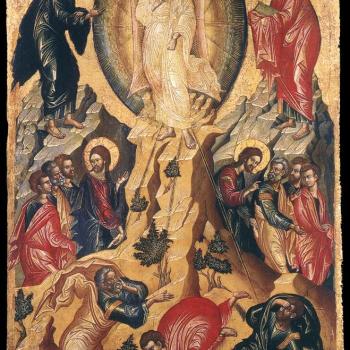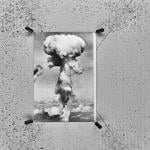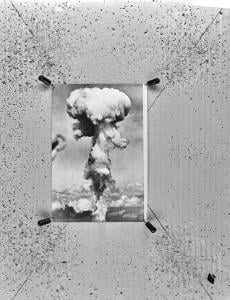
Many people say, due to divine providence, that there are no coincidences in the world. That, I think, is true to some degree, but not always in the way people say this mean. God certainly is engaged with history, tying things together, but we are not puppets under God’s control. We have free will, and the interaction between people in history will create all kinds of patterns, many of which will be intended, but many of which will not be, and so, there will be coincidences. Such coincidences, while not planned, can slowly influence us and history, creating new situations which started out as coincidental, but by the way they are embraced, become intentional, which is why it is sometimes difficult to determine which events are mere coincidences and which are not. That is, we can take a coincidence, and after observing it, make something out of it, infusing meaning to events which did not have meaning; when we do so, I think there is an element of subcreation going on. We are making something out of the chaos around us; history is not just a collection of unrelated, random events, but the meaning which develops out of those events, the meaning of which we (and God) impose upon it. We can think of what is going on as being similar to the way grace perfects nature, but now, we use the grace or potential given to us to make temporal existence meaningful, allowing us to turn mere accidents of history into historical events full of meaning.
August 6 will always be a day of importance for me. On it, I see the convergence of three different events, a convergence which could be coincidental, but might not be. Each of the events are important in their own way, but I find myself either seeing some meaning behind their convergence, or imposing such meaning upon it. What are those three events? Why is it so important for me ? It is the day on which I was born, a day on which I find one of the worst actions humanity has ever done, occurred (the atomic bombing of Hiroshima), but also a day which is associated with one of the most mysterious and spiritually influential events of Christ’s life, the transfiguration.
The transfiguration is not only a major event in Christ’s life, it is a major event for Eastern Christian spirituality. The light which the apostles saw coming from Christ, the Light of Tabor, is that aspect of the glory of God which humans can apprehend and unite with – it is the uncreated energy of God manifest in and through Christ’s body, showing us that our whole being can receive God’s deifying grace and partake of God’s glory. Images of the saints, with their halos, are to be understood as representing this fact – that is, the halo represents the same light as was seen coming from Christ on Tabor. I have found Eastern spirituality which relates to Tabor has had a profound influence in my own spiritual and theological development, and that I was born on the feast of the transfiguration, therefore, seems to be coincidental and yet, knowing the connection between the feast with my birthday, I often wonder if it were not something more, that it was a providential sign affirming that I should be a Byzantine Catholic.
Just as it makes me glad to see the Eastern spiritual tradition connected with my birthday, it grieves me that it is also the day on which the atomic bomb was first used against city. It is an event which should never have happened. Due to the association of the bombing of Hiroshima with my birthday, I have found myself constantly pondering the meaning of the event itself, and in doing so, being led to promote the work for peace and justice in the world. The use of the bomb was indefensible; it was an act of great evil despite the justifications many try to create in order defend what happened (justifications which rely upon the notion that the ends justify the means). The bomb did not need to be used. Japan was already willing to surrender. The United States wanted to push for unconditional surrender so that it could execute revenge against the Japanese. The bloodlust of the American people was appeased by the sacrifice of countless Japanese lives, countless innocents, but, once such bloodlust is given what it wants, it wants more, and more, acting like a monstrous demon, demanding those who heed its call to sacrifice their integrity for the sake of a short-lived sense of satisfaction.
I see many Christians, many Catholics, who continue to defend the indefensible and support the bombing of Hiroshima despite official Catholic teaching. To be sure, many who do this have not been properly taught and either do not know the official teaching, or the moral principles which lie behind it. Many have been led to think Catholic morality is principally concerned with sexual morality, and so find their moral focus being on secondary moral issues. This has shown me the rot within many contemporary Christian narratives, making me even more concerned about exploring and reflecting on issues of peace and justice. Therefore, being born on a day of infamy, has led me to try to learn the lesson of history, to proclaim the evil which was done on my birthday, and to do what I can to convince people to work with me to make sure such evil does not happen again. That way, I can give, as it were, some of the grace I have received and use it to heal the damage done on the day itself, to give the day new meaning, one which highlights the potential evil of humanity , contrasting it with the glory revealed to us by Jesus on Mount Tabor.
The use of the atomic bomb at Hiroshima represented the height of human power and might, human glory, a glory which is used, not to lift up and make things better, but to destroy: humanity, when caught up in its own glory, turns nihilistic, thinking the only way to prove its glory is by its power of destruction. The transfiguration shows us our true glory does not come from ourselves, and our contingent nature (and the voidness inherent in contingency), but from God, the source and foundation of our existence. We are able to become better, to participate in God’s glory, the glory of the divine life, the glory which is the glory of love. What we see representing human glory by its use of the atomic bomb can be seen as representing a Satanic inversion of divine glory. The transfiguration is the deification and glorification of creation by way of its participation in the divine life itself, a glorification which lifts everything up and makes everything better, while the use of the atomic bomb shows us how humanity cannot think about making things better, but only how to try to control and manipulate nature, making it use what potential it has before it expires.
Every year, I think about the interplay which is going on between the transfiguration and the use of the atomic bomb. Most of the time, when contemplating the day, I write more on the positive side by engaging Eastern spirituality and its explorations of the light of Tabor. But, even when I do not discuss Hiroshima, it is always there in the back of my mind. I cannot but think about the atomic bomb and the madness of humanity which is demonstrated by its use, a madness which if it is not cured, will lead humanity to its own self-destruction. It does not have to be. The transfiguration shows us the cure. Let us try to participate in the light of Tabor for ourselves, and if we do, share the grace and love we have received with others, so that humanity can be healed from its madness and try to make something positive out of its existence.
* This Is Another Post From My Personal (Informal) Reflections And Speculations Series
Stay in touch! Like A Little Bit of Nothing on Facebook.
If you liked what you read, please consider sharing it with your friends and family!
N.B.: While I read comments to moderate them, I rarely respond to them. If I don’t respond to your comment directly, don’t assume I am unthankful for it. I appreciate it. But I want readers to feel free to ask questions, and hopefully, dialogue with each other. I have shared what I wanted to say, though some responses will get a brief reply by me, or, if I find it interesting and something I can engage fully, as the foundation for another post. I have had many posts inspired or improved upon thanks to my readers.




